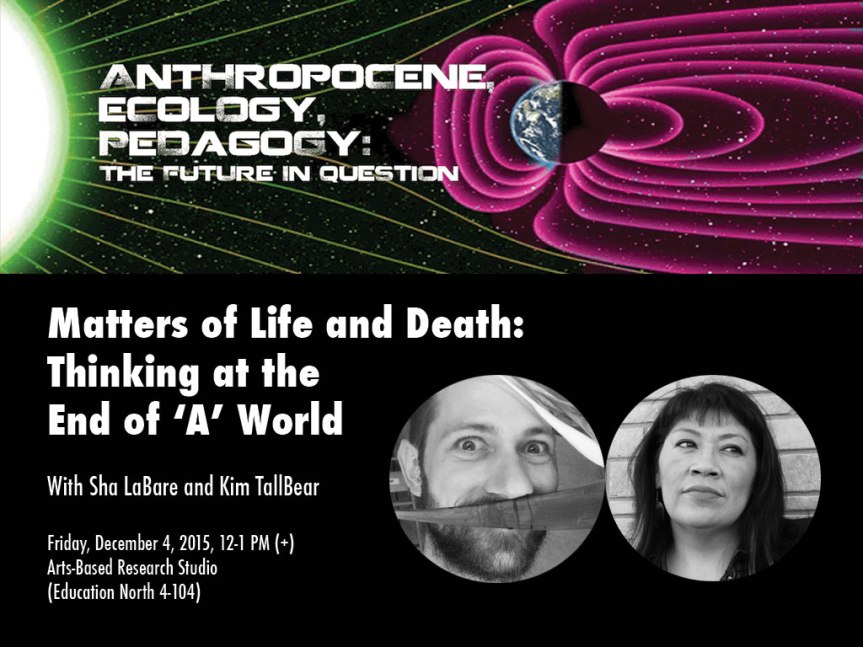“I’ve never cared much about my own personal death, but for some reason the collapse of entire ways of life – and in this case, the way of life, twisted yet beautiful, that made me what I am – has given me a shock” (Sha LaBare, 2015).
Please join us for the final fall iteration of the “Anthropocene, Ecology, Pedagogy: The Future in Question” discussion series with a special conversation between science fiction scholar and ‘barking moonbat’ Sha LaBare and Associate Professor in the Faculty of Native Studies Kim TallBear. As a culmination of the series discussions thus far, this conversation will question what it might mean to think and act at the precipice of the seemingly impending collapse of civilization as we know it. Tugging at the threads of what some have termed “ecological anxiety disorder” (Robbins & Moore, 2013) from both personal and theoretical perspectives, this conversation will question what it means to live, and potentially die, alongside the persistent ecocide so carefully hidden from us by our highly mediated human exceptionalist culture. In addition, the conversation will ask what makes our conjectures on this ‘end-of-the-world’ different from the post-apocalyptic world that many peoples have lived through for over a century. As TallBear writes: “[my ancestors] have been post-apocalyptic since 1862”. Operating in the precarious space between denial and despair, this conversation will weave together a series of questions concerning what constitutes life for us and how theories of the anthropocene might allow us to start ripping down the walls constructed in the name of human supremacy over the planet

Bios
Sha LaBare (PhD, History of Consciousness 2010) is a science fiction scholar particularly interested in radical ecological ethics at and after the end of the world as we know it. His writing and teaching focus on global warming, multispecies becomings, the ecology of everyday life, and imagining alternatives to the world that is alas the case.
Kim TallBear, author of Native American DNA: Tribal Belonging and the False Promise of Genetic Science, is Associate Professor, Faculty of Native Studies, University of Alberta. Dr. TallBear combines indigenous studies, science and technology studies, feminist and queer theory to interrogate the nature/culture split in Western society and its role in producing related –isms: colonialism, racism, speciesism, sexism, and homophobia, and the accompanying violence done to diverse bodies. Dr. TallBear is a citizen of the Sisseton-Wahpeton Oyate in South Dakota. She is also descended from the Cheyenne & Arapaho Tribes of Oklahoma. She blogs on Indigeneity & Technoscience at http://www.kimtallbear.com.

